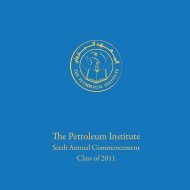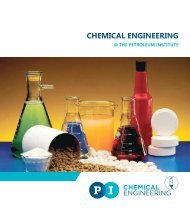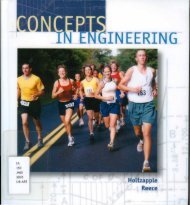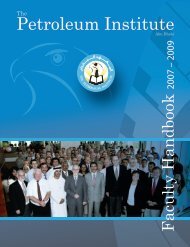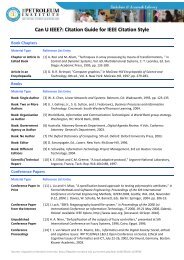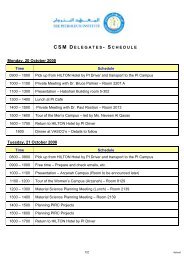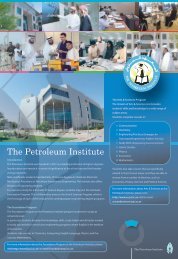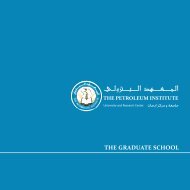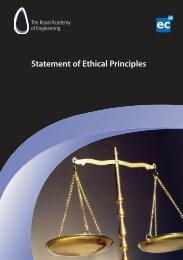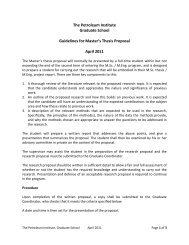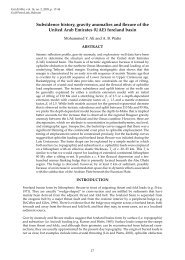ANNUAL REPORT - The Petroleum Institute
ANNUAL REPORT - The Petroleum Institute
ANNUAL REPORT - The Petroleum Institute
You also want an ePaper? Increase the reach of your titles
YUMPU automatically turns print PDFs into web optimized ePapers that Google loves.
<strong>The</strong> <strong>Petroleum</strong> <strong>Institute</strong> | Annual Report - Academic Year 2011 - 2012<br />
II. <strong>The</strong> Chairman’s Message<br />
<strong>Petroleum</strong> Engineering is a relatively new<br />
industry-specific engineering discipline<br />
related to the exploration, development and<br />
exploitation of hydrocarbon resources.<br />
Typically, the realm of a <strong>Petroleum</strong> Engineer<br />
often starts from a few hundreds or thousands<br />
of metres subsurface and ends at the gate<br />
of the refinery. Because petroleum engineers<br />
deal with the hydrocarbon resources that<br />
is primarily located underground, we also<br />
need to have a sound understanding of<br />
the geoscientific principles and be able<br />
to manage the challenges posed by risks<br />
and uncertainties. <strong>The</strong>refore, a total system<br />
approach is critical in the development and<br />
exploitation of hydrocarbon resources while<br />
emphasizing the adaptability to and awareness<br />
of new technology; collaboration in a multidisciplinary<br />
setting; strict attention to the<br />
environmental, health and safety issues; ability<br />
to communicate effectively; thriving in cultural<br />
diversity and being respectful of others; and<br />
last, but certainly not least, the ability to have<br />
fun while learning and working.<br />
<strong>The</strong>refore, put simply, as petroleum engineers<br />
our task may include any or all of the following:<br />
• confirm and evaluate the presence of<br />
petroleum reservoir,<br />
• quantify resource and reserve sizes<br />
in order to make investment and<br />
development decisions,<br />
• plan field development programs to<br />
meet technical and economic objectives<br />
during hydrocarbon recovery, including<br />
commitments to clients (refineries, gas<br />
processing plants, etc.),<br />
• develop models and simulate various<br />
recovery processes to optimize ultimate<br />
recovery,<br />
• design and execute drilling programs<br />
to construct wells that produce<br />
hydrocarbons,<br />
• design and operate surface facilities that<br />
process hydrocarbons to meet sales<br />
specifications,<br />
• operate and monitor field production for<br />
most effective recovery,<br />
• all while conducting every activity in a<br />
manner that is consistent with utmost<br />
respect for the health and safety of all<br />
personnel and the safety of equipment<br />
while protecting the environment.<br />
Our curriculum offers a well-balanced total<br />
system approach that blends engineering<br />
theory and practice with geosciences<br />
and management principles, including an<br />
understanding of risks and uncertainties.<br />
Our program is staffed by a teaching and<br />
research faculty and laboratory engineers<br />
with over 150 years of accumulated industrial<br />
experience in petroleum exploration and<br />
production businesses and over 90 years<br />
of experience in university-level teaching<br />
and research, and we continually seek to<br />
build a strong faculty team, supported by<br />
a team of highly competent laboratory and<br />
research personnel. Those who qualify will<br />
enjoy a competitive compensation package,<br />
exemption from most taxes, an exciting and<br />
challenging work environment, and wonderful<br />
travel and recreation opportunities, all while<br />
enjoying an exotic lifestyle.<br />
Our laboratories are world class, equipped<br />
with the state-of-the-art equipment<br />
including a full-size drilling, cementing and<br />
workover simulator in addition to a portable<br />
simulator; a reservoir engineering computer<br />
laboratory with 30 workstations; a reservoir<br />
simulation laboratory with 21 workstations;<br />
a 3-D visualization laboratory; core and<br />
rock mechanics laboratories; hydrocarbon<br />
66



